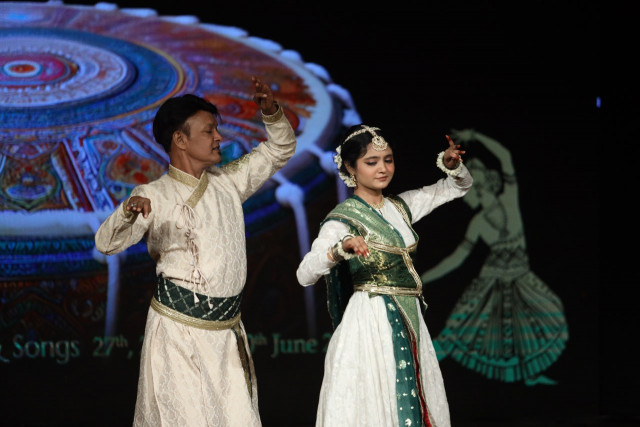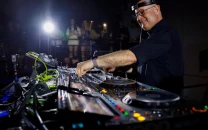Walled City cultural troupe mesmerises Karachi with an evening of folklore
Event featured an exciting lineup of various performing arts and storytelling traditions from South Asia

The National Academy of Performing Arts (NAPA) in Karachi was a hive of cultural celebration on Thursday evening as the Walled City of Lahore Authority (WCLA) troupe presented an enthralling performance that left the audience spellbound. Held at NAPA’s Zia Mohyeddin Theater, the event showcased a rich tapestry of Pakistan's classical and folk traditions under the banner of “Renewing Glory.”
The evening commenced with a bustling red carpet, graced by numerous dignitaries and celebrities, setting the tone for an exquisite cultural display. Among the notable attendees was former senator and member of NAPA’s board of directors, Javed Jabbar, who delivered a warm welcome address.
Bringing to life
He expressed NAPA’s dedication to preserving the performing arts in all forms, stating, “NAPA is committed to preserving the performing arts in every form, and bringing the WCLA troupe to Karachi is a testament to that.” He also provided an overview of the program that lay ahead.
The event kicked off with a riveting presentation tracing Pakistan’s rich cultural heritage and the underpinnings of WCLA. As per its name, the initiative focuses on preserving and restoring the folklore and rituals around Lahore. However, the throngs of visitors who are drawn to Sindh for historic happenings such as Mirbahar festival and Lal Loi highlight the power of exchange and human connection.
Seguing from the legend of Morirro, Director-General of WCLA Kamran Lashari detailed the significant restoration efforts undertaken in the Walled City of Lahore. His presentation not only underscored the architectural and cultural revival but also stressed the importance of preserving heritage for future generations.
Lashari animated the evening with his experience in leading Lahore’s social and horticultural rejuvenation, remarking, “Working for restoration is easy. It's what comes after restoration that needs commitment and imagination.” He said, “It's the reuse, the management of the site where we lack a sustainable model which would bring the sites to life and build linkages with people.”
The Director-General lamented the neglect various institutions have generally reserved for heritage sites and urged the audience to regard them beyond bricks and mortar for historical upkeep. He asserted the need to connect people with sites as a key tenet of any restoration project. Following this, NAPA chairman Syed Jawaid Iqbal presented Lashari with a commemorative memento, marking the occasion.
Stories of yore
After a brief intermission, the stage was set for the evening’s main performances. The father-daughter duo, Zikria and Jessica Iqbal, opened with an enthralling kathak performance, showcasing intricate footwork and expressions through dance. True to the commentary preceding this segment, the audience relished kathak as a form of complex storytelling.
Jessica then charmed the audience with a solo piece that further demonstrated her prowess and grace. Rahat Fateh Ali Khan’s popular song O Re Piya played host to the young artist’s enchanting choreography and was received with elation from the attendees.
The program continued with a breathtaking performance by Raja Mughal and his team, whose precise movements and expressive faces brought the classical dance form to life. Their performance extolled the fiery rage of Deepak Raag in Bilaval Thaat as narrated in legends. Mughal and his team strapped to their hands a cluster of lights as they moved along to Tansen's fabled fire-bringing melody. Mughal later performed a solo performance of bharatanatyam that was met with rapturous applause.
The evening took a lively turn with performances of folk songs, storytelling, and dances by Fazal Jutt and his group. Their set opened with the tragic romance of Sohni and Mahiwal, rendered in a dynamic Punjabi caper. Their vibrant and energetic presentation celebrated the diverse cultural heritage of Pakistan’s rural communities, resonating deeply with the audience.
The grand finale featured the inimitable Saain Abbas and his ensemble of dhol and shunk players. Brandishing their powerful rhythms and stage presence, it was no surprise that the evening culminated in a standing ovation from the audience.
Throughout the show, the audience's enthusiastic applause and cheers reflected their appreciation of and immersion in the electrifying atmosphere. The evening concluded with a delightful dinner, allowing guests and performers to mingle and celebrate the success of the event.
The “Renewing Glory” program not only showcased the cultural richness of Pakistan but also reinforced the importance of preserving and promoting the performing arts. It was an evening of artistic excellence and cultural pride, leaving a lasting impression on all who attended.
Have something to add to the story? Share it in the comments below.



















COMMENTS
Comments are moderated and generally will be posted if they are on-topic and not abusive.
For more information, please see our Comments FAQ